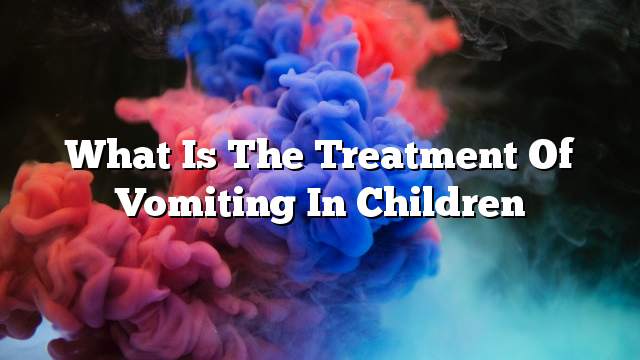Vomiting in children
Vomiting is common in children and infants, and is usually frequent without indicating a serious problem. Vomiting often lasts for a short period of a day or two because it results from a simple, acute disease, such as viral bowel inflammation. Vomiting occurs as a natural reaction to the body, when the nerves sense a stimulus, such as infection or food poisoning or movement, reacting brain centers responsible for vomiting with this catalyst. Thus vomiting is useful for the human body, it saves it from harmful substances and toxins, but it is not recommended to use drugs or ways to induce vomiting. Often accompanied by nausea, which children describe as pain or discomfort in the abdomen. Children with nausea and vomiting often do not take any medication, but in some cases parents should consult a doctor to make sure they do not have more serious health problems.
What should be monitored by these children is that they are not affected by the drought, which results after the child has lost fluids to the body by vomiting, especially if it lasts for a long time or if accompanied by diarrhea, parents must provide their child with the necessary quantities of fluids.
Causes of vomiting in children
Vomiting occurs as a symptom associated with many diseases, and may result from some unsatisfactory medications or conditions. These diseases are often acute and do not pose a threat to the child’s life, and disappear shortly thereafter. The main causes of vomiting in children are as follows:
- Gastrointestinal infections: It is the most common cause of vomiting in children. They are often produced from a viral infection, but bacteria and parasites may cause them as well, continue for just a few days, and disappear without any complications, and may cause diarrhea as well.
- Food Allergy: And the most foods that may be affected by white children and milk products, peanuts and fish, so after knowing the type of food allergens, the child should avoid eating. Other symptoms, such as itching, rash, swollen tongue and throat, often cause difficulty breathing. The patient may suffer from severe cough and low blood pressure, in addition to the feeling of dizziness and imbalance, and may burn the skin of the patient.
- Suffering from intestinal obstruction: This can happen for many reasons, such as swallowing a child with a strange object, or suffering from hypertrophic hyperplasia, in which the muscles forming the last part of the 12-linked stomach, hernia, appendicitis, or gastroesophageal reflux, To the esophagus, in addition to intestinal sprains, in which the intestine wraps around itself causing obstruction, as well as gastrointestinal invasion, which is the entry of part of the intestine into another part.
- Infectious food poisoning: Which occurs as a result of eating contaminated or expired foods. This causes vomiting in older children and adults to diversify the foods they eat compared to the smaller ones, and the child suffers from vomiting and diarrhea for a day or two.
- Suffering from disorders in the central nervous system: The most prominent of these imbalances are viral meningitis, the incidence of concussion or increased pressure within the skull or sister.
Treatment of vomiting in children
Most cases of vomiting in children do not need any treatment. In some cases, however, you should see your doctor immediately for long periods of vomiting, vomiting many times, vomiting or greening, or fever. 39 ° C, or that the child complains of severe abdominal pain, moderate or severe droughts.
Drought is more than one that requires attention when suffering from vomiting. Parents should monitor the child’s shape and behavior to detect signs of dehydration. In mild cases, the child suffers from dry throat and frequent thirst. In mild or severe cases, Lack of urine, lack of tears when crying, cold hands and feet, as the child’s eyes may become submerged, in addition to fatigue and exhaustion.
If the child suffers from vomiting without drought, he can continue the diet as long as his body can bear it. In the case of drought and to compensate fluids lost by the body of the child vomiting, doctors recommend that it is usually given orally prepared solution sold in restaurants under many trade names, as this solution contains the nutrients and minerals needed by the child’s body. It is also recommended to drink liquids in small doses and to wait briefly between doses.
The mother can continue to breastfeed her baby, even if he is vomiting, and there is no need to give him oral solutions. Breast milk is adequate. Doctors are advised to avoid eating high-sugar juices such as apple juice and cherries, It is difficult for the child’s body to digest them. Rather, it is better to feed them with carbohydrate-rich foods to provide the child with the necessary energy, such as potatoes and bread, as well as meat, fruits and vegetables.
